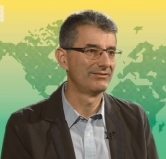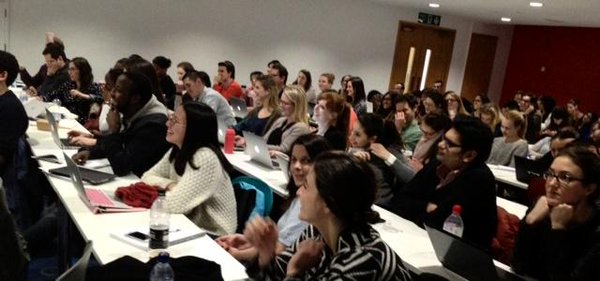In our latest blog series International Development Professor Jean-Paul Faguet wants to know your thoughts on the subject of “Should lecture notes be circulated in advance?”
 Every year my MSc Development Management students ask for lecture notes to be circulated in advance. Every year I decline, waving my hands and invoking vague dangers.
Every year my MSc Development Management students ask for lecture notes to be circulated in advance. Every year I decline, waving my hands and invoking vague dangers.
This year’s group – a particularly energetic bunch – have prompted me to think more carefully. Rather than put my foot down, or give in meekly to stem the complaints, it seems a better idea to discuss the issues openly. Hence we will honour their request for the next couple of months, on condition that students join my colleagues and me in a debate of the underlying issues.
These issues are not just about note-taking, or when students receive lecture slides, but rather questions that are both deeper and broader about the nature of knowledge and the process of learning.
Such issues are likely to be interesting well beyond one programme, or even one department. The blog seems like a good forum in which to collect ideas and thrash them out. Not least because my own thoughts on the matter are rather fuzzy. I’d like to work out exactly what it is I find objectionable. I’m prepared to accept that it may be middle-aged grumpiness on my part, and open to being convinced I’m wrong.
I hope students, colleagues, and alumni will post their views here. Contributions from people with research expertise in pedagogy would be particularly welcome. It would be even better if the winning argument came from students.







To summarize the arguments of supporting the notion that the lectures not be circulated in advance in the blog post, it would be as follows:
(1) There is no master lecture note that works well for everyone because each student has different knowledge, experience, beliefs and priorities into the lecture hall with them.
(2) The important of notes is in taking the notes like training, not in the notes themselves.
(3) The advance circulation might give students a false security and discourage students to work hard. Some students scroll through lecture slides, taking a few notes in the margins.
However, in terms of (1) and (2), the importance of making own notes, these arguments assume that every student can completely grasp what lecturers talk in order to make their own notes.
In fact, each lecture has different – sometimes strong – accents and English proficiency of students vary. Moreover, some lecturers seem to talk relatively faster in spite of the recommendation that presenters take at least two minutes per slide, possibly much more in the document of “GUIDELINES FOR DV431 SEMINAR PRESENTATIONS”. Considering these points, I would say that the assumption of the argument seems wrong.
In terms of (3), we have to consider the reverse risk that some students might concentrate on taking down every single word rather than deeply reflecting what lecturers are taking. If students keep the lecture notes at hand, they can concentrate on lectures themselves and taking their truly own notes.
What exactly do you have when you have ‘the lecture notes’ in advance?
My argument might stray from directly answering to the question above, but my concern would be ‘what we would lose when we do not have ‘the lecture notes’ in advance’; we might lose the opportunity of delivering/receiving the messages in the lectures.
As long as LSE is being proud of itself as an international school and accepting students with various levels of English proficiency (IELTS overall 7.0 minimum), international students, especially those for whom English is a second language, should deserve a certain consideration.
Note: As my arguments focus on the aspect of ‘during lectures’ rather than preparation, hence I would not request the circulation in much advance, as long as students keep the lecture notes at hand during the lecture.
Regards,
Michiru Toda
Reference
https://blogstest.lse.ac.uk/internationaldevelopment/2015/11/19/the-great-lecture-notes-debate-part-two-the-case-against-notes-vs-knowledge/ [Access: 20/11/2015]
Thanks Michiru. This is a thoughtful piece that has much value. Thank you for your reply.
I look forward to hearing what others have to say!
Although I do not deny that taking careful, detailed notes during a lecture is a necessary mental exercise that helps in learning the material – the fact remains that we know we will receive the notes after the lecture regardless. This means that having them in advance can only possibly help those who want to make use of them, while those who prefer to only listen would do so either way. In other words, having the lecture notes in advance doesn’t disincentivize students from either attending the lecture or writing things down. If anything it would lower the risk of the lecture becoming an exercise in dictation, giving us the freedom to add our own thoughts by supplementing the pre-typed basics. They’d also serve as a safety net – what if you’re stuck behind someone tall and can’t see the screen? Or if the projector stops working?